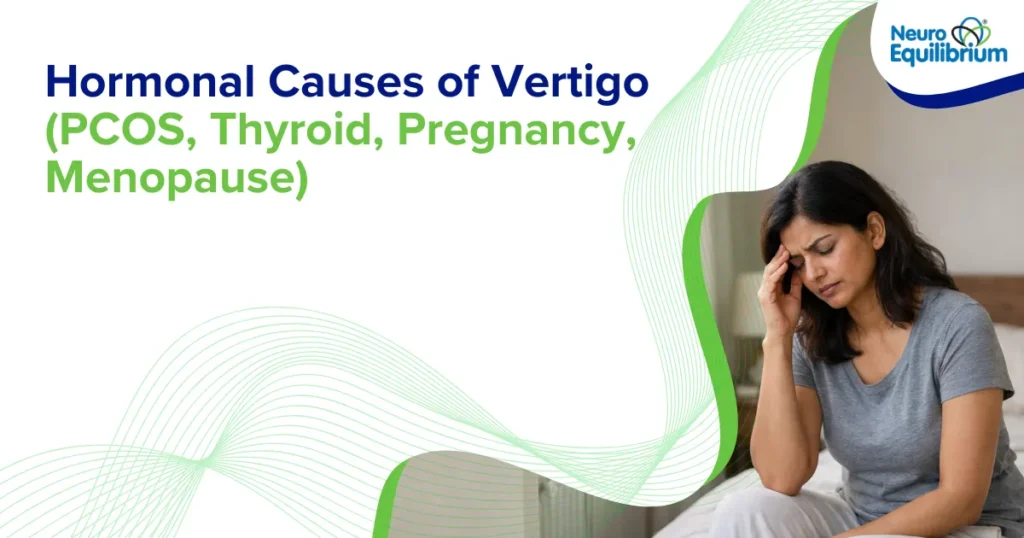During pregnancy, the body transforms physically in multiple ways. Vertigo in pregnancy can be a disorienting experience of movement , spinning or unsteadiness. Vertigo typically occurs due to problems in the balance control center known as the vestibular system. The imbalance can increase the risk of fall which is why vertigo occurring in pregnancy must be investigated at the earliest.
Know More About Vertigo
- What is Vertigo? Causes, Symptoms, & Treatment
- Beware of Falls: The Importance of Fall Prevention in Elderly
- Top 3 Essential Vertigo Tests: How to Identify and Manage Balance Disorders
Symptoms of Dizziness in PregnancyVertigo in Pregnancy: What You Need to Know
During pregnancy, you may notice the following symptoms of dizziness:
- Vertigo: A sensation of spinning or rotation, even when the body is still.
- Unsteadiness: A feeling of imbalance or being off-balance.
- Lightheadedness: A sensation of feeling faint or as if you might pass out.
- Nausea and Vomiting: These symptoms often accompany vertigo and can be particularly troublesome for pregnant women.
- Sensitivity to Light and Sound: Heightened sensitivity that may worsen dizziness.
- Headache and Neck Pain: Dizziness can occur with or without a headache, and neck pain may also be present.
- Motion Sickness: Some individuals with vestibular disorders are prone to motion sickness.
- Blurred Vision or Difficulty Focusing: Trouble with vision or concentration can accompany dizziness.
- Weakness or Extreme Tiredness: Feeling unusually fatigued or physically drained.
- A Spinning Sensation: A false sense of movement affecting you or your surroundings, even without actual movement.
Trimester-Specific Patterns
The nature of vertigo and balance problems differs between pregnancy trimesters since your body transforms drastically with each stage. The following are some patterns that are observed for vertigo in pregnancy.
- First Trimester: Vertigo is most frequent here, affecting around 22.7% of pregnant women. This is often linked to hormonal changes that impact the vestibular system, which controls balance.
- Second Trimester: Women experience greater instability and gait imbalance in pregnancy since this condition affects 12.1% of pregnant women.
- Third Trimester: The condition of balance worsens because 14.8% of women experience instability during pregnancy, along with 11.1% who face potential fall risks. Your center of gravity shifts while blood circulation decreases due to blood vessel compression from an enlarging uterus.
NeuroEquilibrium provides customized solutions for your unique challenges. Address these symptoms with a comprehensive evaluation and personalized care by contacting us to get tested at the nearest center.
Causes and Contributing Factors of Vertigo in Pregnancy
Vertigo is a symptom that originates from various health conditions affecting the inner ear and brain along with heart problems and medications usage and lifestyle triggers. The basis for pregnancy includes multiple additional factors during this period.e:
- Hormonal Fluctuations: The increased hormone levels of estrogen and progesterone disrupt inner ear fluid balance, which may lead to aggravated vestibular migraine symptoms.
- Blood Pressure Changes: Blood pressure reduction during pregnancy and expanded blood volume alters regular brain blood circulation patterns, thus causing dizziness. On the other hand,pregnancy can lead to increased blood pressure. When hypertension is detected ,it should be managed at the earliest as it can have a negative impact on the baby and the placenta.
- Calcium and Vitamin D Deficiency: Common in the second trimester, these deficiencies can destabilize otoconia, triggering Benign Paroxysmal Positional Vertigo (BPPV).
- Postural Shifts: As your pregnancy progresses, weight gain and a shifting center of gravity can increase instability and make you feel unsteady.
- Dehydration or Hypoglycemia: The higher metabolic needs during pregnancy may cause low blood sugar or dehydration, which can cause more severe dizziness.
- Anemia : Reduced hemoglobin level can lead to lightheadedness and fatigue.
Common Vestibular Disorders in Pregnancy
Disorder | Characteristics | Triggers in Pregnancy |
| BPPV | Brief vertigo episodes triggered by head movements (e.g., rolling over) | Prolonged bed rest, calcium deficiency |
| Vestibular Migraine | Vertigo with headaches, sensitivity to light and sound | Hormonal shifts, stress |
| Ménière’s Disease | Episodic vertigo, tinnitus, and hearing loss | Reduced serum osmolality, fluid retention |
How Can You Manage and Prevent Vertigo in Pregnancy?
Managing and preventing vertigo in pregnancy is possible with a few practical steps. Here are some strategies to help reduce dizziness and keep you safe:
- Move Slowly: Avoid standing up too quickly. It is important to proceed slowly when moving between positions because it helps avoid dangerous blood pressure drops.
- Stay Hydrated: Drinking water continuously throughout the day will help preserve hydration while supporting blood flow.
- Eat Small, Frequent Meals. Combining carbohydrates with protein aids in maintaining blood sugar levels, thereby preventing energy loss, which could result in dizziness.
- Practice Good Posture. Proper sitting or standing posture improves body balance and decreases physical strain.
- Rest When Needed: Sit or lie down immediately if you feel dizzy until the sensation passes.
- Try Gentle Exercises: Prenatal yoga or light stretching can enhance circulation, improve balance, and promote overall well-being.
- Use Safe Remedies: Deep breathing, relaxation techniques, and resting in a cool, quiet place can help alleviate symptoms.
- Dietary Adjustments: People with Ménière’s disease should limit their salt and caffeine consumption to control their symptoms with nutritional adjustments. Small, regular meals help prevent pregnancy-related hypoglycemia that frequently leads to dizziness.
- Vestibular Rehabilitation: Balance exercises with gaze stabilization training help patients become more stable while reteaching their brains to counteract balance difficulties. The exercises accommodate individual needs while being safe for pregnant patients.
- Repositioning Maneuvers: The modified Epley maneuver proves to be a secure and successful approach for treating benign paroxysmal positional vertigo (BPPV) throughout the initial stages of pregnancy. The medical procedure allows doctors to reposition inner ear crystals that cause vertigo and quickly reduce symptoms.
NeuroEquilibrium offers advanced diagnosis of vertigo and balance disorders, along with personalized treatment strategies. You can manage dizziness and vertigo in pregnancy better through expert consultation and recommended approaches.

When Should You See a Doctor?
Most expectant mothers experience light dizziness during pregnancy, though they need to monitor signs that differ from standard. Pregnant women need immediate medical assistance if they experience several recurrent spells of dizziness or present one or more symptoms, including headaches, vision problems, speech troubles, shortness of breath, chest pain, fainting, and extreme exhaustion. These warning indicators can reveal special medical conditions.
NeuroEquilibrium operates clinics that specialize in treating vertigo and balance disorders. Maternal health assessment and dizziness checks should begin immediately through expert medical advice so pregnant women can remain reassured to have a stress-free pregnancy period.
Conclusion
Pregnant women often feel alarmed by balance issues, but comprehension of possible causes and proper management techniques help them manage them well. If you experience severe vertigo during pregnancy, it is crucial to seek medical attention to safeguard both your health and your baby’s. Medical care enables pregnant women to control their vertigo symptoms while preserving their pregnancy health.
Sources
- Serna-Hoyos L.C., Herrón Arango A.F., Ortiz-Mesa S., Vieira-Rios S.M., Arbelaez-Lelion D., Vanegas-Munera J.M., Castillo-Bustamante M. (2022). Vertigo in Pregnancy: A Narrative Review. PMC. https://pmc.ncbi.nlm.nih.gov/articles/PMC9233861/ (PMC)
- International Journal of Otorhinolaryngology and Head and Neck Surgery (2022). Vertigo during pregnancy: a review. https://www.ijorl.com/index.php/ijorl/article/view/3607 (ijorl.com)
- Silver N. (2019). What Causes Dizziness in Pregnancy? Healthline. https://www.healthline.com/health/pregnancy/dizziness-in-pregnancy (Healthline)
- “Dizziness During Pregnancy.” AmericanPregnancy.org. https://americanpregnancy.org/healthy-pregnancy/pregnancy-health-wellness/dizziness-during-pregnancy/ (American Pregnancy Association)
- “Dizziness during pregnancy: When is it a concern?” Heart / American Heart Association. 2024. https://www.heart.org/en/news/2024/01/18/dizziness-during-pregnancy-when-is-it-a-concern (www.heart.org)
- “Dizziness in Pregnancy: Causes and Treatment.” MedicalNewsToday. https://www.medicalnewstoday.com/articles/dizziness-in-pregnancy (Medical News Today)
- “Dizziness, Vertigo, and Balance Disorders — Causes and Prevention in Pregnancy.” MGM Hospital (article on pregnancy-related dizziness). https://www.mgmhospitalpatna.com/blog/understanding-pregnancy-related-dizziness-causes-and-symptoms/ (mgmhospitalpatna.com)
FAQs
What causes vertigo during pregnancy?
Vertigo in pregnancy can happen due to hormonal changes, low blood pressure, ear problems, low sugar levels, anemia (low iron), dehydration, or changes in posture as the baby grows.
Book a consultation at your nearest NeuroEquilibrium Clinic today.
Is vertigo during pregnancy normal?
Women often feel lightheaded during pregnancy, but it’s important to seek medical advice if symptoms continue. Consult a doctor if dizziness is frequent or severe, especially if accompanied by headaches, blurred vision, or fainting sensations.
Book a consultation at your nearest NeuroEquilibrium Clinic today.
How can I prevent vertigo during pregnancy?
To avoid vertigo in pregnancy, stand up slowly, drink lots of water, eat small meals often, keep good posture, rest when needed, and try light exercises like prenatal yoga.
Book a consultation at your nearest NeuroEquilibrium Clinic today.
When should I see a doctor for vertigo during pregnancy?
Consult a doctor when your vertigo symptoms are persistent or strong and you develop dizziness along with headaches or changes in vision or feelings of sudden spinning combined with breathing difficulty and chest pain or fainting episodes.
Book a consultation at your nearest NeuroEquilibrium Clinic today.
Can vertigo during pregnancy affect my baby?
While vertigo in pregnancy may not directly affect your baby, frequent falls or severe symptoms could pose risks. Frequent medical interventions and appropriate management help preserve both mother’s and baby’s health conditions.
Book a consultation at your nearest NeuroEquilibrium Clinic today.
















